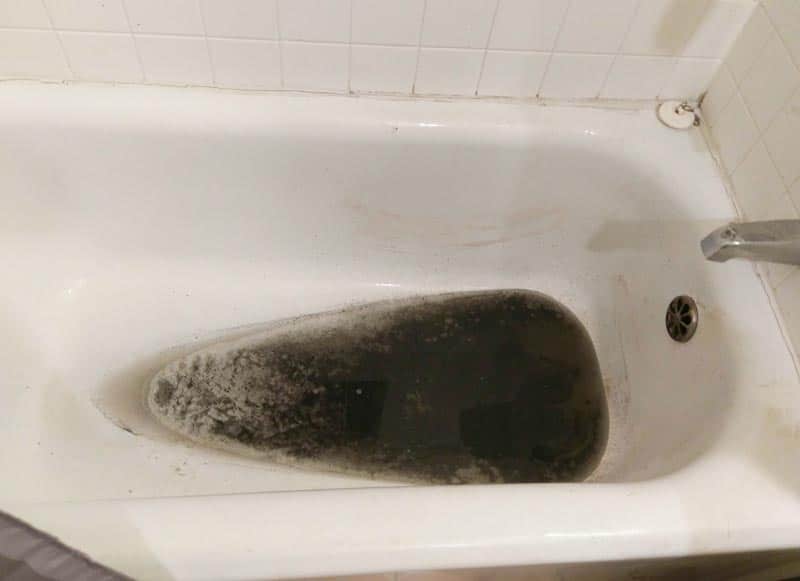Unpacking the Causes of Effluent in the Bathtub
Unpacking the Causes of Effluent in the Bathtub
Blog Article
Are you currently hunting for guidance involving Why sewage is coming up through your bathtub?

Sewer back-up in the bathtub can be an upsetting and unsanitary issue for any kind of house owner. Not only is it inconvenient, yet it likewise postures major health and wellness dangers and indicates underlying problems with the plumbing system. Recognizing why sewer is turning up via the bath tub is vital for taking ideal activity to deal with the trouble effectively.
Introduction to the Concern
Understanding the Problem
When sewer draws back up into the bath tub, it's a clear sign of a trouble with the drainage system. The wastewater that ought to be moving far from your home is rather finding its back into your space, which can cause significant damages and carcinogen.
Possible Reasons
A number of factors can add to sewage back-up in the tub. From clogs in the sewer line to problems with the plumbing framework, recognizing the origin is essential for discovering an option.
Usual Factors for Sewage Back-up
Obstructions in the Sewer Line
Among the most common reasons for sewage backup is a clog in the drain line. This can happen because of the build-up of debris, grease, or international objects in the pipelines, avoiding correct flow and triggering sewer to support right into your bathtub.
Tree Origin Intrusion
Tree roots seeking moisture and nutrients can penetrate sewer lines via tiny cracks or joints. In time, these roots can expand and expand, creating considerable damages to the pipes and bring about sewer back-up problems.
Aging Infrastructure
Older homes might have obsoleted plumbing systems that are much more prone to rust, fractures, and degeneration. As pipes age, they come to be extra susceptible to leakages and blockages, increasing the likelihood of sewage backup events.
Heavy Rainfall or Flooding
Throughout durations of heavy rainfall or flooding, the drain system might end up being overwhelmed with excess water, triggering backups and overflows. This can lead to sewage backing up right into tubs and other components inside the home.
Wellness Dangers Connected With Sewer Back-up
Contamination of Water Supply
Sewer backup can pollute the water supply in your house, positioning a significant health and wellness danger to you and your family members. Exposure to contaminated water can bring about intestinal problems, skin infections, and various other ailments.
Spread of Condition
Sewage has damaging germs, infections, and bloodsuckers that can create a series of illness, including hepatitis, cholera, and gastroenteritis. Entering contact with sewer or infected surfaces puts you in danger of infection.
Mold and mildew Growth
Moisture from sewer back-up can produce ideal problems for mold development in your home. Mold and mildew spores can exacerbate respiratory issues and create allergic reactions in delicate individuals, making punctual cleanup crucial.
Indications of Sewer Back-up
Foul Odors
Unpleasant odors emanating from drains or fixtures, particularly in the washroom, may suggest sewage backup issues. These odors are commonly solid and consistent, signifying a problem that needs instant focus.
Slow Draining Fixtures
Bathtubs, sinks, and toilets that drain slowly or otherwise in all could be experiencing sewer back-up. If numerous fixtures are influenced all at once, it's likely that the concern stems from a typical point, such as the primary sewer line.
Gurgling Sounds
Strange gurgling or bubbling sounds coming from drains pipes when water is running in other places in your home are indicative of air trapped in the plumbing system. This air buildup can result from sewer back-up and ought to be investigated without delay.
Immediate Actions to Take
Turning Off Supply Of Water
In the event of sewage back-up, it's vital to shut off the supply of water to avoid more contamination and damages. Situate the primary water shutoff valve in your home and closed it off till the concern can be solved.
Contacting a Specialist Plumber
Managing sewage back-up is not a DIY task. Get in touch with a qualified plumber with experience in handling sewage-related problems to examine the circumstance and carry out required repairs or cleanings.
Staying Clear Of Contact with Polluted Water
Till the sewage backup is dealt with, stay clear of contact with polluted water to avoid the spread of microorganisms and pathogens. Use protective equipment if you have to remain in the damaged area and clean your hands extensively afterward.
Preventive Measures
Regular Upkeep of Sewer Lines
Set up normal examinations and maintenance of your sewer lines to determine and attend to potential concerns prior to they escalate right into significant problems. This can include clearing out particles, checking for tree origin breach, and fixing any type of broken pipes.
Installing Bayou Shutoffs
Consider installing backwater valves in your plumbing system to prevent sewage from flowing back right into your home throughout durations of heavy rainfall or flooding. These shutoffs automatically close when water draws back up, securing your residential or commercial property from contamination.
Proper Disposal of Home Waste
Stay clear of purging anything other than toilet tissue and human waste down the bathroom to avoid clogs and obstructions in the sewer line. Dispose of grease, oil, and various other household chemicals effectively to decrease the threat of plumbing problems.
Cleaning Up After Sewer Backup
Sanitation Procedures
Completely disinfect and disinfect impacted locations after sewer backup to get rid of unsafe germs and avoid mold and mildew development. Use proper cleansing items and protective gear to guarantee secure and effective cleaning.
Remediation of Influenced Locations
Fix any type of damage to flooring, wall surfaces, or components triggered by sewage backup. Relying on the level of the damages, you might need to change carpets, drywall, or other products to recover your home to its pre-loss condition.
Why is There Sewage Coming Up Through the Bathtub
Sewage in your bathtub is a major problem that can make you want to abandon the bathroom for good. You don’t have to. However, it is important to identify the source of the issue and take the necessary steps to resolve it in order to avoid any health risks and property damage. In this article, we will discuss what could be causing sewage to back up through your bathtub so you can take action quickly and effectively.
The Main Reason For Sewage Backup in The Bathtub
All the sinks and toilets in your home connect to different pipes that lead to the main sewer line. The sewer line then connects to the municipal sewer system. This connection works seamlessly on a daily basis, but there can sometimes be a problem with the main sewer line.
The most common cause of sewage backup is a clogged or blocked main sewer line. The main sewer line can be clogged due to the accumulation of debris, tree roots or grease buildup, or other materials. Another possible cause is a collapsed pipe. When this happens, your toilets and sinks won’t be able to drain properly. This is when sewage starts backing up through the bathtub. If the problem has been occurring for some time now, it might be time to consult with a plumber as there may be more severe damage that needs fixing.
How Can You Tell if it’s Coming From Your Sewer Line?
If you’re experiencing a sewage backup in your bathtub, then you can use a few simple methods to determine if it is coming from the main sewer line. First, try to unclog the tub drain with a plunger or an auger and see if that helps. If not, then inspect all of the drains in your house and check if there is any blockage in them. If some of the other drains are not working fine, then it’s likely the problem is with your main sewer line.
Common Signs of a Clogged Main Sewer Line
If you suspect that your main sewer line is blocked, then there are a few common signs to look out for. Frequent clogs in your home are a sure sign of a clogged sewer line. You can also check for slow drainage from all the plumbing fixtures.
Slow Drains
If you notice that it takes longer for your sinks and toilets to drain, then this could be a sign of a clogged main sewer line.
Frequent Clogs
Another common sign is that your drains or toilets become clogged almost all of the time. If this happens, then it could be a sign that the main sewer line is blocked.
Water Backup
Do you notice water or sewage coming back up from any of the drains in your home? If your answer is yes, you may have a clogged main sewer line.
Sinkholes
If you’ve noticed sinkholes in your yard or overflowing sewage from the ground, you may be facing a blocked sewer line issue.
Your Shower or Sink Makes Gurgling Noises
Have you noticed gurgling noises coming from your sink or shower lately? These are typically signs of a blocked sewer line and should be checked out immediately.
How to Prevent a Main Sewer Line Clog
Once you’ve identified that your main sewer line is clogged, it’s important to take steps to prevent it from happening again. The best way to do this is to avoid putting any solid material that can clog the drain, such as grease and other debris. You should also be mindful of what you flush down your toilet. In addition, you should schedule regular maintenance for your main sewer line. This will help keep it clear and free from clogs or backups.
What Should You do if You Notice Sewage Backing up Through The Bathtub?
If you’ve noticed sewage backing up through the bathtub, then it is important to call a professional plumber immediately. A plumber can inspect the situation and determine what the cause is, such as a blocked main sewer line. They will also be able to advise you on how best to fix the issue. In some cases, a simple drain cleaning may be all that is needed.
However, if the blockage is severe, then your plumber may need to use more advanced methods to clear the blockage.
No matter what, it is important to always call a professional plumber if you experience any kind of sewage backup. They will be able to assess the situation and provide you with a solution that is best for your home.
https://baylorinc.com/blog/why-is-there-sewage-coming-up-through-the-bathtub/

I ran across that review about when doing a lookup on the web. Feel free to set aside a second to share this post if you liked it. We appreciate your readership.
Estimate Free
Report this page